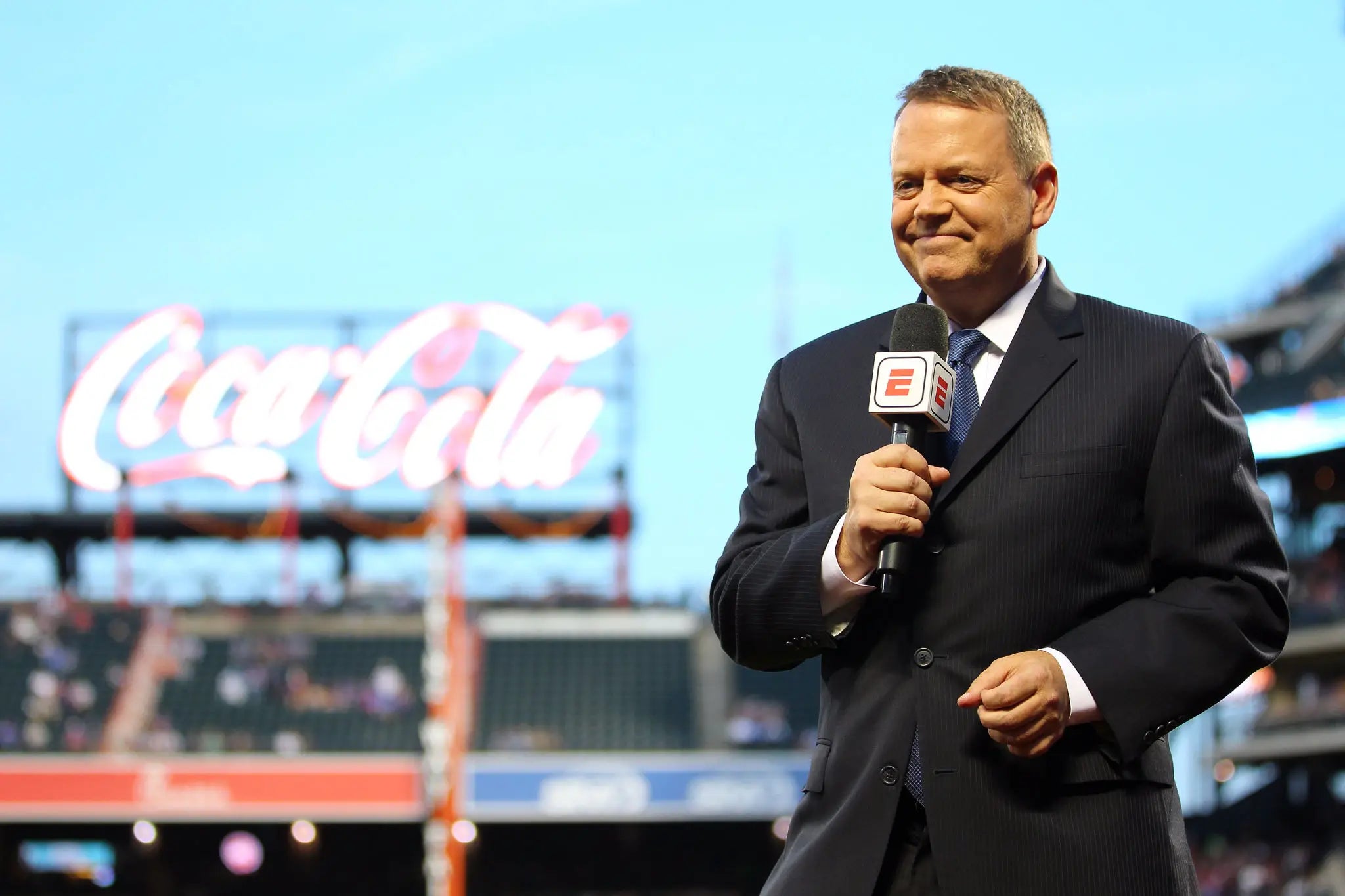 Rich Schultz. Getty Images.
Rich Schultz. Getty Images.
The end of an era is upon us with ESPN officially getting out of Major League Baseball coverage. The way it works is that baseball will continue to be aired on ESPN through the 2025 season, but after that it’s curtains because of this opt out.
(Front Office Sports) One of the most significant divorces in sports media is now becoming a reality as MLB and ESPN have “mutually agreed” to opt out of their rights deal three years early, marking a stunning degradation of a relationship dating to 1990.
The current seven-year rights pact, paying the league $550 million per year, was set to run through 2028, but will now expire after the upcoming season after the two sides were unable to come to terms on a revised relationship. The mutual opt-out had been a source of growing tension for months.
ESPN had long objected to its fee, particularly in light of separate MLB rights deals with Apple and Roku that are worth $85 million and $10 million, respectively, per year. Recent talks between the two sides did not produce any sort of revised agreement, and the pact is now set to expire after the 2025 season. ESPN will still broadcast MLB events such as Sunday Night Baseball, the Home Run Derby, and the wild-card round of the playoffs this season, as planned.
To be honest, it’s not the most surprising story of all time. ESPN mostly cares about the NFL and NBA. The weekly game spots for MLB games have all but vanished over the years. Baseball Tonight completely diminished as well. All we really had left was Sunday Night Baseball and now at the end of the year it’ll all be gone. When it comes to daily talk shows the only time you’ll hear of baseball, outside of a Jeff Passan report, is when Stephen A. Smith picks that random day of the summer to let out some uneducated takes on whether Shohei Ohtani could be the face of the game without speaking English or how Mike Trout keeps getting hurt in a non-contact sport. They don’t care. The sport has been a complete afterthought to the network for quite some time, which is sad for a guy like me who loves it dearly.
Rob Manfred gave his thoughts on everything going on and was noticeably pissed off talking about how little they were covered over the years by the network.
He took aim at the network’s linear distribution, which has fallen to 53.6 million homes, roughly half the level of 2011. To that end, he said, “We do not think it’s beneficial for us to accept a smaller deal to remain on a shrinking platform.”
He said the league has “not been pleased with the minimal coverage” MLB receives on ESPN outside of live game coverage. Even casual viewers would certainly be able to notice a difference compared to how the network approaches the NFL and NBA.
Calling ESPN a “shrinking platform” had to feel good now that this is all done. It’s pretty sad though in general. The old days of Sunday Night Baseball with Jon Miller and Joe Morgan were awesome. Those games would feel special when your team was playing.
Baseball Tonight leading into the game felt important as well. Sadly ESPN just doesn’t value the sport anymore, even if it’s rallying in popularity and ratings recently while the NBA nose dives.
So now what? I guess TBS/TNT could expand their coverage. You’ll probably see some more streaming giants try to get in the mix and join Apple/Roku. As we know, baseball’s bread and butter lies heavily on regional coverage, not national. That doesn’t mean if done right there isn’t a spot for a big game of the week.
Unfortunately all of this shows you how ESPN has changed over the years, shifting more away from actual sports coverage. The good ol’ days of the 2000s when there would be no point to watch any other channel are long gone. I’d wake up on Saturdays and involuntarily turn on ESPN. Social media keeping us up to date has changed that a little for sure, but the overall quality of product back then was so much better than it is now. Take me back.
P.S. Something I didn’t know was that MLB was ahead of the game with streaming years ago and had a product that others desperately wanted. In classic baseball fashion, instead of licensing it, they ended up selling the whole thing and made pennies on the dollar.
(Sports Business Journal) Boras also sounded off on streaming. MLB was the first league to stream one of its games, doing so for a Yankees-Rangers contest in August 2002. MLB Advanced Media founded BAMTech in 2015, but sold a controlling stake in that company to Disney for $1.58B two years later. At the time that deal was lauded for delivering each MLB team owner $50 million.
“We invented streaming, which is a huge component to the NBA contract,” said Boras. “And what did we do with it? We didn’t license it, we sold it. We gave it away. And then we entered into cable contracts knowing that streaming was the cancer of cable.
“Other leagues didn’t do that,” he continued. “And so when we talk about why our revenue streams are where they are, look at the TV contract and it says that we have got to better with our negotiation of the media rights.”
Therefore, Boras believes, MLB needs better representation at the bargaining table. He did not mention exactly who should take the job.
“The solution is a negotiator. This is about appropriate representation. And a rights structure. I think that’s why players hire me. So why wouldn’t MLB hire someone appropriately that knows how to handle that negotiation for them when they look at the NBA?” Boras said. “We have double the content and higher ratings, and we’re getting half of what the NBA gets? Does that not tell you that it’s not the product, it’s the representation.


